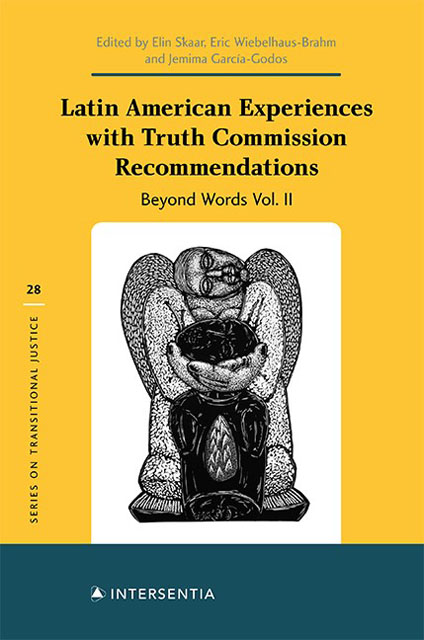Brazil’s National Truth Commission: Recommendations for a Pending Democratic Agenda
Published online by Cambridge University Press: 19 November 2022
Summary
INTRODUCTION
Twenty-six years after the conclusion of the Brazilian military dictatorship (1964 – 85), the creation of the National Truth Commission (Comissão Nacional da Verdade, CNV) provided a historical opportunity to realign Brazil's difficult project for memory, truth and justice. Created in 2011 and effectively established in May 2012, the CNV launched an intense effort that lasted over two years, culminating with the delivery of a voluminous final report to the Executive Branch, drafted for the purpose of clarifying the circumstances of the disappearance of persons during the period 1946 to 1988. While this recent commission has attracted significant attention, like elsewhere, its recommendations remain underexplored.
Following the framework of the Beyond Words project, we conduct a focused analysis of the report's recommendations. Specifically, we track their formulation as well as the concrete factors and processes aff ecting this task. Furthermore, we examine the challenges in implementing the recommendations. To do so, we combine documentary analysis of the Commission's final report, the processing and classification of the 29 recommendations and semi-structured interviews with relevant parties in Sao Paulo during September 2016. We also used secondary material, such as academic articles and press reports, for the purpose of reconstructing the context of the Commission's work, the nature of the Brazilian transition, the role of human rights issues, the country's recent history, and the stance taken by the parties involved. In reviewing the formulation and impact of these recommendations, we also drew from human rights reports, specialized articles, CNV public documents available on its website, and archival material of the Universidad Estatal Paulista Júlio de Mesquita filho (Sao Paulo Julio de Mesquita filho State University).
Organizationally, the next section describes Brazil's long, drawn-out transition from military rule. Next, Section 3 provides an overview of the Commission's work. Section 4 presents a summary of the CNV's recommendations. Section 5 explains the criteria used to define implementation and formulates a tentative typology to analyze the impact of the Brazilian case. We conclude by reflecting upon the implications of the CNV's recommendations for Brazil's social and political development.
A PROTRACTED TRANSITION: THE ROLE OF THE HUMAN RIGHTS AGENDA
To understand the conditions that led to the creation of the National Truth Commission in Brazil, one must begin with the end of the dictatorship in 1985 and trace activism through the approval of the law that created the Commission in 2011.
- Type
- Chapter
- Information
- Latin American Experiences with Truth Commission Recommendations: Beyond Words Vol. II , pp. 197 - 230Publisher: IntersentiaPrint publication year: 2022



